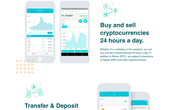/latest/2019/01/crypto-exchange-coincheck-receives-license-a-year-after-suffering-530-million-hack/
Crypto Exchange Coincheck Receives License a Year After Suffering $530 Million Hack
crypto-exchange-coincheck-receives-license-a-year-after-suffering-530-million-hack
Hacked cryptocurrency exchange Coincheck has recently become a licensed entity, after receiving a license approved by the country’s Financial Services Agency (FSA), after it improved its risk management and governance systems with ”concrete internal controls.”
According to an announcement published by Monex Group, a Japan-based brokerage firm that acquired Coincheck for $34 million in April of last year, the exchange is now registered with the Kanto Financial Bureau.
This sees Coincheck join a growing list of regulated cryptocurrency exchanges in Japan. These include the trading platform VCTRADE, operated by financial services giant SBI Holdings. Coinbase itself, the largest cryptocurrency exchange in the US, has stated it’s looking to get licensed in the country this year.
The announcement reads:
With the registration as a cryptocurrency exchange agency serving as a milestone, Coincheck strives to continue offering reliable services for our current and prospective customers in a safe and stable manner. Coincheck is also committed to further strengthening security and enhancing usability.
Last year, Coincheck notably suffered a cyberattack that saw hackers steal over $530 million worth of NEM tokens from its wallets. At the time, the exchange wasn’t registered with the FSA, and was ordered to strengthen security systems and submit a business improvement plan to the regulator.
The incident forced it to shut down for a few months, and to slowly resume services later on. In November, it resumed trading in XRP and FCT, after reopening new account signups in October, to finally resume normal operations. In the third quarter of last year, it recorded $5.25 million in losses.
In Japan, bitcoin has been recognized as a legal payment method since April of 2017, and as such all exchanges operating in the country have to ensure its users go through anti-money laundering (AML) and know-your-customer (KYC) checks.







